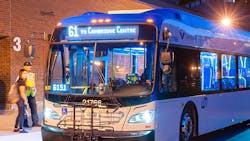Federal, provincial and local monies to fund more than C$41 million in transit and infrastructure projects in the Region of Waterloo
The Region of Waterloo in Ontario will advance 10 projects including bus stop enhancements and pedestrian and cycling safety improvements with more than C$41 million (US$30.25 million) in funding made available through federal, provincial and local sources.
Government officials, citing the “profound effect” on the economy and the need to support the health and well-being of Canadian citizens, say strategic investments in public transportation infrastructure play a key role in ensuring Ontarians can get to work, school and essential services on time and safely back home at the end of the day.
“Investing in modern and accessible public transportation systems is essential to building healthy, inclusive and resilient communities. Many residents in Waterloo Region rely on public transit and cycling routes to get around the region each day. The investments we are making with our partners are helping make communities more livable for families while moving forward on sustainability and fighting climate change. They will also provide jobs as we recover from the economic effects of the pandemic,” said Canada’s Minister of Infrastructure and Communities Catherine McKenna.
Highlights of the projects that will proceed with the funding include:
- C$9.37 million (US$6.91 million) for the Conestoga College Doon Campus transit station to be expanded to include six new buses and a bus terminal, bike parking, heated shelters and new signage. More transit users will be able to access the system safely and more efficiently.
- C$2.52 million (US$1.86 million) for on-street transit infrastructure improvements that will increase the safety and accessibility of the transit system. 60 bus stops will be renovated with new hard surface pads. Also, 10 new bus shelters will be built and improvements will be made to two pedestrian crossings and 10 intersections.
- C$3.75 million (US$2.77 million) for the construction of several heated bus shelters and bike storage areas at the University of Waterloo bus station. These shelters will include up-to-date technology and will improve the passenger experience and accessibility to the transit system.
The government of Canada is investing more than C$13 million (US$9.59 million) in these projects through the Public Transit Infrastructure Stream (PTIS) of the Investing in Canada infrastructure plan. The government of Ontario is providing more than C$11 million (US$8.12 million) to the projects, while the Region of Waterloo is contributing more than C$17 million (US$12.54 million).
“Investing in modern and integrated public transit systems and active transportation are essential for building healthier, low carbon communities of tomorrow. The projects announced today in the Region of Waterloo will provide residents with more alternatives for getting where they need to go safely and affordably. This is a great example of how we are working with our partners to build stronger, more sustainable infrastructure that will serve communities now and in the future,” said Canada’s Minister of Diversity and Inclusion and Youth, and Member of Parliament for Waterloo Bardish Chagger.
About the Author

Mischa Wanek-Libman
Group Editorial Director
Mischa Wanek-Libman is director of communications with Transdev North America. She has more than 20 years of experience working in the transportation industry covering construction projects, engineering challenges, transit and rail operations and best practices.
Wanek-Libman has held top editorial positions at freight rail and public transportation business-to-business publications including as editor-in-chief and editorial director of Mass Transit from 2018-2024. She has been recognized for editorial excellence through her individual work, as well as for collaborative content.
She is an active member of the American Public Transportation Association's Marketing and Communications Committee and served 14 years as a Board Observer on the National Railroad Construction and Maintenance Association (NRC) Board of Directors.
She is a graduate of Drake University in Des Moines, Iowa, where she earned a Bachelor of Arts degree in Journalism and Mass Communication.
